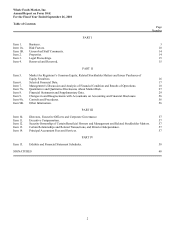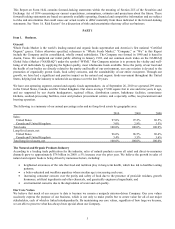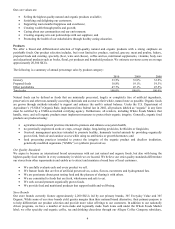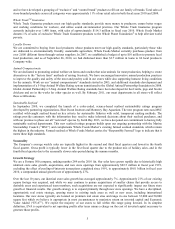Whole Foods 2010 Annual Report Download - page 18
Download and view the complete annual report
Please find page 18 of the 2010 Whole Foods annual report below. You can navigate through the pages in the report by either clicking on the pages listed below, or by using the keyword search tool below to find specific information within the annual report. 12
Brand Value
We believe our Company has built an excellent reputation as a food retailer, socially responsible corporation and employer.
We believe our continued success depends on our ability to preserve, grow and leverage the value of our brand. Brand value
is based in large part on perceptions of subjective qualities, and even isolated incidents can erode trust and confidence,
particularly if they result in adverse publicity, governmental investigations or litigation, which can have an adverse impact on
these perceptions and lead to adverse affects on our business or team members.
Natural and Organic Products Availability
There is no assurance that quality natural and organic products will be available to meet our future needs. If other
supermarkets significantly increase their natural and organic product offerings or if new laws require the reformulation of
certain products to meet tougher standards, the supply of these products may be constrained. To a certain degree, we are also
dependent on our largest supplier, United Natural Foods, Inc. (“UNFI”), which accounted for approximately 27% of our total
purchases in fiscal year 2010. Any significant disruption in the supply of quality natural and organic products could have a
material impact on our overall sales and cost of goods sold.
Impairment of Long-Lived Assets
Our total assets included long-lived assets totaling approximately $1.96 billion at September 26, 2010. Long-lived assets are
evaluated for impairment whenever events or changes in circumstances indicate that the carrying amount of an asset may not
be recoverable. Our impairment evaluations require use of financial estimates of future cash flows. Application of alternative
assumptions could produce significantly different results. We may be required to recognize impairments of long-lived assets
based on future economic factors such as unfavorable changes in estimated future undiscounted cash flows of an asset group.
Long-lived asset impairments could result in material charges that would adversely affect our results of operations and
capitalization.
Lease Obligations
The majority of our stores, distribution centers, bakehouses and administrative facilities are leased, with expiration dates
ranging from 1 to 35 years. We are subject to risks associated with our current and future real estate leases. Our costs could
increase because of changes in the real estate markets and supply or demand for real estate sites. We generally cannot cancel
our leases, so if we decide to close a location, we may nonetheless be committed to perform our obligations under the
applicable lease including paying the base rent for the remaining lease term. As each lease expires, we may fail to negotiate
renewals, either on commercially acceptable terms or any terms at all. As of September 26, 2010, we had 25 leased
properties that are not being utilized in current operations, with expiration dates ranging from 5 months to 19 years. The 25
leased properties represent acquired dormant locations, stores closed post-acquisition, and stores closed due to relocation.
Perishable Products
We believe our stores more heavily emphasize perishable products than other supermarket stores. Perishable products
accounted for approximately 66.5% of total sales at Whole Foods Market locations in fiscal year 2010. The Company’s
emphasis on perishable products may result in significant product inventory losses in the event of extended power outages,
natural disasters or other catastrophic occurrences.
Legal Matters
From time to time, we are party to legal proceedings, including matters involving personnel and employment issues, personal
injury, intellectual property, acquisitions, and other proceedings arising in the ordinary course of business. Our results could
be materially impacted by the decisions and expenses related to pending or future proceedings.
Accounting Standards and Estimates
Generally accepted accounting principles and related accounting pronouncements, implementation guidelines, and
interpretations for many aspects of our business, such as accounting for insurance and self-insurance, inventories, goodwill
and intangible assets, derivatives, store closures, leases, income taxes and share-based payments, are highly complex and
involve subjective judgments. Changes in these rules or their interpretation or changes in underlying estimates, assumptions
or judgments by our management could significantly change or add significant volatility to our reported earnings without a
comparable underlying change in cash flow from operations.
Loss of Key Management
We are dependent upon a number of key management and other team members. If we were to lose the services of a
significant number of key team members within a short period of time, this could have a material adverse effect on our
operations. We do not maintain key person insurance on any team member. Our continued success also is dependent upon
our ability to attract and retain qualified team members to meet our future growth needs. We face intense competition for
qualified team members, many of whom are subject to offers from competing employers. We may not be able to attract and
retain necessary team members to operate our business.
























